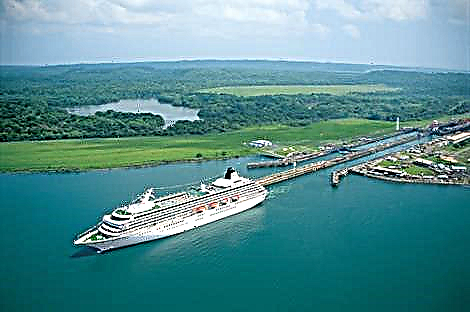The list of the most profitable countries in terms of business development was Tax Foundations, a non-profit tax organization. For more than 80 years, its experts have been calculating who paid where and when.
For compilation ranking of countries according to the level of tax burden on business tax rates for business in more than 200 countries were studied. And it turned out that over the past 30 years, the corporate tax rate has been constantly decreasing.
- In 1980, the average income tax rate was 46.63%.
- Now the average for 208 countries is approximately 23.03%.
- Even the United States, which has traditionally held the view that business should pay (for a long time, the tax rate there was one of the highest in the world), slightly weakened the tax grip. Now they are closer to the middle of the list.
Countries with the lowest tax burden on business
| Country | Taxes |
|---|---|
| Cyprus | 12.5% |
| Ireland | 12.5% |
| Liechtenstein | 12.5% |
| Macao | 12% |
| Moldova | 12% |
| andorra | 10% |
| Bosnia and Herzegovina | 10% |
| Bulgaria | 10% |
| Gibraltar | 10% |
| Kyrgyzstan | 10% |
| Former Yugoslav Republic of Macedonia | 10% |
| Nauru | 10% |
| Paraguay | 10% |
| Qatar | 10% |
| East Timor | 10% |
| Republic of Kosovo | 10% |
| Hungary | 9% |
| Montenegro | 9% |
| Turkmenistan | 8% |
| Uzbekistan | 7.5% |
10. Cyprus
Corporate tax rate: 12.5%
Europe as a whole is considered one of the most favorable regions for business in terms of tax burden. The average income tax there is 18.38%. As for Cyprus, it has long been considered a kind of rich Mecca, where serious businessmen launder money.
True, the Cypriots themselves vehemently protest against this characteristic and claim that they attract businessmen from all over the world with an exceptionally favorable tax regime and the facilitated process of starting their own business. And the taxation of the country fully complies with the requirements of the European Union and the OECD.
In addition to Cyprus, the same business tax rate is in Ireland and Liechtenstein. However, Ireland has its own specifics: 12.5% there are taken only from income derived from trade. But if the entrepreneur produces something or delivers services, then the rate there is already more serious - 25%.
9. Macau
Corporate tax rate: 12%
Next in the ranking of places with the lowest tax burden on business is Macau - a legacy of the colonial era that China was able to return only at the very end of the last century.
This second after Hong Kong is the so-called special administrative region of China. That is, a territory that in many respects remains independent. For example, Macau has its own currency. And in 2001, a law was adopted that legalized gambling. Thanks to him, at present “Chinese Las Vegas” is one of the leading gaming centers not only in Asia, but throughout the world.
8. Moldova
Corporate tax rate: 12%
And here is the first post-Soviet country in the list of states with the lowest tax burden on business in 2019. The corporate tax rate in Moldova is only 12%, but over the past 14 years it has fluctuated more than once.
The highest (20%) was recorded in 2004, and the lowest (0%) - in 2008. Perhaps due to such a low rate, the country's foreign trade is growing stronger. Over the past couple of years, its volume has increased by 18.4%.
7. Nauru
Corporate tax rate: 10%
This is a tiny state located on a small coral island in the Pacific Ocean, with a population of only 10 thousand people. The country does not even have its own capital, and it is not needed with an area of 21 km2.
After the barbaric mining of phosphorites, the island is experiencing a severe environmental disaster, and in an attempt to make money in the early 90s of the last century, it was decided to turn Nauru into an offshore zone. It became so popular that a financial institution fighting money laundering was forced to ban the creation of offshore banks on the island. However, to this day, the corporate tax rate in Nauru remains one of the lowest in the world.
6. Paraguay
Corporate tax rate: 10%
An important part of Paraguay’s economy is the so-called “Makila” regime - this is when large foreign companies organize product assembly plants in Latin America, using the cheapness of the local workforce and the prospect of hourly pay. Of course, no sick leave and leave for workers is not provided.
Mainly businessmen from the USA are engaged in this. “Why are they?” You may ask, looking at the map and noting that Paraguay is farther from the United States than Mexico, where such enterprises are very common. Everything is very simple: the tax rate in Paraguay is the lowest in all of Latin America.
5. Kyrgyzstan
Corporate tax rate: 10%
What do the former union republic of the USSR, the safest state in the world engaged in the export of oil and gas, and a small island state in the Indian Ocean have in common? Only one thing is the low corporate tax rate. The first country is Kyrgyzstan, and the second two are Qatar and East Timor.
4. Andorra
Corporate tax rate: 10%
The tiny state, sandwiched between France and Spain, compares favorably with its neighbors in tax policy. For example, Andorrans introduced the income tax only in 2015 and then under pressure from the European Union. However, this small country is still considered the ideal starting point for expats who want to make money. It does not have a property tax, gift tax or even inheritance tax, and income tax is accrued only when selling property. Moreover, you can become a citizen of a country only by creating an enterprise in the country, or by investing in an existing one.
In addition to Andorra, ten percent tax on business boasts Bulgaria - one of the countries most beloved by European entrepreneurs. In addition to the low tax rate (by the way, for individuals this is the same 10%), businessmen are attracted by its convenient territorial location, well-developed infrastructure and the low salaries of workers traditional for the countries of the former Eastern Bloc.
3. Hungary
Corporate tax rate: 9%
Despite the fact that Hungary is still a country dependent on the European Union and its subsidies, the forecasts for its development are most favorable. The government of Orban (the country's prime minister) managed to achieve GDP growth and an overall improvement in the welfare of the population.
Perhaps one of the lowest corporate tax rates in Europe played a significant role in this. The Hungarian government not only attracts foreign companies, but also supports the growth of its own small enterprises. And the labor market is full of qualified specialists at a lower price than usual in Europe.
Montenegro, as a small Balkan state, is trying to survive by attracting foreign investors. It compares favorably with both a low business tax rate and transparency of the tax system. Montenegro is simply forced to behave decently, because otherwise it will not be allowed into the EU, which the country is trying to achieve by all means.
2. Turkmenistan
Corporate tax rate: 8%
Such a pleasant figure for businessmen applies only to residents - residents of Turkmenistan. It is their enterprises that are taxed at 8%. For individual resident entrepreneurs, the rate is even lower and amounts to only 2%.
But foreigners will have to pay more. For them, the corporate tax rate is 20% in accordance with the Law on Oil.
1. Uzbekistan
Corporate tax rate: 7.5%
Such a low corporate tax rate is a kind of “general hospital temperature”. In Uzbekistan, the rate is different for different enterprises.
- Standard - 12%.
- For commercial banks - 20% (it was also reduced from 22%, as it was last year).
- But mobile operators will have to pay more - for them, the rate has increased from 14 to 20%.
- From a tax point of view, engaging in small business in Uzbekistan is slightly more profitable. For him, the tax rate decreased to 4%.
Which countries have the highest tax burden on business?
| Country | Taxes |
|---|---|
| United Arab Emirates | 55% |
| Comoros | 50% |
| Puerto rico | 39% |
| Suriname | 36% |
| Chad | 35% |
| Democratic Republic of the Congo | 35% |
| Equatorial Guinea | 35% |
| Guinea | 35% |
| India | 35% |
| Kiribati | 35% |
| Malta | 35% |
| Saint martin | 35% |
| Sudan | 35% |
| Zambia | 35% |
| Sint martin | 35% |
| France | 34.43% |
| Brazil | 34% |
| Venezuela | 34% |
| Reunion | 33.33% |
| Cameroon | 33% |
The leader is the United Arab Emirates with a terrifying figure for a businessman - 55%. Let us clarify that such a tax rate is imposed only on foreign companies engaged in oil production and refining, as well as foreign bankers. But the attitude towards their businessmen in the UAE is much milder.
Then come developing countries with volatile economies located in Africa and South America. The tax rate they have is from 50 to 33%. Of the large, dynamically developing countries, India and Brazil have the highest tax rates (35 and 34%, respectively).
In the list of “fisted” countries there are even two European countries - France (rate 34.43%) and Malta (35%). No wonder that the French prefer to organize a business somewhere outside their own country.
Countries where business is tax-free
- Anguilla
- Bahamas
- Bahrain
- Bermuda
- Cayman islands
- Guernsey
- Isle Of Man
- Jersey
- Palau
- Turks and Caicos Islands
- Vanuatu
- British Virgin Islands
Corporate taxes in Russia 2019
Russian corporate taxes and tax liabilities vary by business structure. Here is the table of the tax burden in Russia in 2019 depending on various types of economic activity according to the Federal Tax Service.
| Type of economic activity (according to OKVED-2) | Taxes% |
|---|---|
| TOTAL | 10.8 |
| Agriculture, forestry, hunting, fishing, fish farming - total | 4.3 |
| plant growing and animal husbandry, hunting and the provision of related services in these areas | 3.5 |
| forestry and logging | 7.5 |
| fishing, fish farming | 7.9 |
| Mining - Total | 36.7 |
| extraction of fuel and energy minerals -total | 45.4 |
| mining, except fuel and energy | 18.8 |
| Manufacturing - total | 8.2 |
| food, beverage, tobacco | 28.2 |
| manufacture of textiles, clothing | 8.1 |
| manufacture of leather and leather goods | 7.9 |
| wood processing and the manufacture of wood and cork products, except furniture, the production of straw products and weaving materials | 2 |
| production of paper and paper products | 4.4 |
| printing and copying of information media | 9.2 |
| production of coke and petroleum products | 5.1 |
| production of chemicals and chemical products | 1.9 |
| production of medicines and materials used for medical purposes | 6.9 |
| manufacture of rubber and plastic products | 6.3 |
| manufacture of other non-metallic mineral products | 8.9 |
| metallurgical production and manufacture of finished metal products, except machinery and equipment | 4.4 |
| manufacture of machinery and equipment nec | 8.8 |
| manufacture of electrical equipment, manufacture of computers, electronic and optical products | 9.9 |
| manufacture of computers, electronic and optical products | 12.5 |
| manufacture of electrical equipment | 6.7 |
| manufacture of other vehicles and equipment | 4.7 |
| manufacture of motor vehicles, trailers and semi-trailers | 5.1 |
| Providing electric energy, gas and steam; air conditioning - total | 6.8 |
| production, transmission and distribution of electricity | 8.1 |
| production and distribution of gaseous fuels | 1.3 |
| production, transmission and distribution of steam and hot water; air conditioning | 6.5 |
| Water supply, water disposal, waste collection and utilization, activity and pollution elimination - total | 8.4 |
| Building | 10.2 |
| Wholesale and retail trade; repair of motor vehicles and motorcycles - total | 3.2 |
| wholesale and retail trade in motor vehicles and motorcycles and their repair | 2.7 |
| wholesale trade, except for wholesale trade in motor vehicles and motorcycles | 3.1 |
| retail trade, excluding trade in motor vehicles and motorcycles | 3.6 |
| Activities of hotels and catering establishments - total | 9.5 |
| Transportation and storage - total | 6.8 |
| activity of railway transport: intercity and international passenger and freight transportation | 8.5 |
| pipeline transport | 4.5 |
| water transport | 9.3 |
| air and space transport | – |
| postal and courier activities | 14.4 |
| Information and communications activities - total | 16.4 |
| Real estate activities | 21.3 |
| Administrative activities and related additional services | 15.4 |












